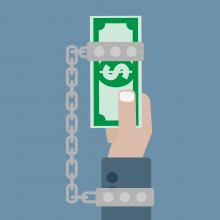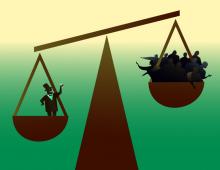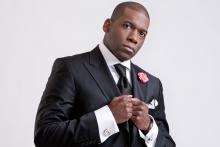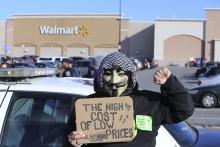Economic Justice

I was listening to public radio in Boston recently when a public health expert half-jokingly noted that to find the hotspots of anti-vaccination fervor you could follow these steps:
1. Look at a map of where the Whole Foods are located.
2. Place a pin down where there is a Whole Foods.
3. Draw a 10-mile radius around the pin.
The point being — and this expert was only kidding a bit — that anti-vaccination is largely found among white, highly educated, wealthy advocates.
To me, what’s more obvious about this is when we are white, highly educated, and wealthy — like many of our mainline Protestant congregations — then the feelings of being in control and being free are so important that we are willing to risk the health and lives of others for the sake of being some sort of adjective like “natural” or “free.” Vaccines, designed to protect, become oddly reversed as a possible threat to freedom and “natural living.”
In reality, it is only our privilege that allows us to consider not vaccinating. The same sin that has deeply troubled our sexuality is also at the root of this crisis — the deep-seated belief that the highest good will be that we are free to do whatever we want to our bodies. This continuing belief in total freedom not only fails to take seriously human failings but continues to create crises wherever it goes.
When we view this world as a place where we can make decisions about our lives without regard to the impact to our neighbors, we have failed to heed Jesus’ own words that the greatest commandment is to love God and to love our neighbors as ourselves. We have failed to hear from the apostle Paul that our bodies are now God’s temples, and that they are now for the sake of the world.

In a powerful sermon that signaled his desire to push ahead with historic reforms, Pope Francis on Sunday said the Roman Catholic Church must be open and welcoming, whatever the costs.
He also warned the hierarchy not to be “a closed caste” but to lead in reaching out to all who are rejected by society and the church.
“There are two ways of thinking and of having faith: we can fear to lose the saved and we can want to save the lost,” Francis told hundreds of cardinals and bishops arrayed before him in St. Peter’s Basilica at a Mass centered on the story of Jesus healing a leper rather than rejecting him.
“Even today it can happen that we stand at the crossroads of these two ways of thinking,” the pope said as he outlined the current debate in the church between those seen as doctrinal legalists and those, like Francis, who want a more pastoral approach.
“Jesus responds immediately to the leper’s plea, without waiting to study the situation and all its possible consequences,” Francis declared. “For Jesus, what matters above all is reaching out to save those far off, healing the wounds of the sick, restoring everyone to God’s family. And this is scandalous to some people!”

On Feb. 8, civil rights attorneys sued the city of Ferguson, Mo ., over the practice of jailing people for failure to pay fines for traffic tickets and other minor, non-criminal offenses.
And to this I say: It’s about time.
Growing up with an attorney father — a “yellow dog Democrat” one at that — who often took on poor clients in return for yard work and other non-cash payments, I heard early and often about the unfair — and illegal — practice of debtors’ prison. A poor person could not be jailed for failure to pay a fine, my father told me. I trusted his words were true.
So imagine my surprise when at the age of 18, I was arrested for unpaid traffic fines.
At that time I was a stay-at-home mom, trapped in a too-early marriage I would one day leave. My son was probably 6 months old. When the knock came at my door and I saw a police officer standing outside, I didn’t hesitate to answer.
The officer confirmed my identity and told me I was under arrest for failure to pay traffic tickets I had received for driving an unregistered vehicle.
I know that I should have paid the registration. Once ticketed, I know I should have worked out a payment plan. I know I should have taken responsibility for my illegal actions.
But I was young, inexperienced with the system, and very, very poor. Too poor to keep up with even the most modest of payment plans.
AS ICE CREAM entrepreneurs, Jerry and I have been on a journey that has led us squarely to the conclusion that, while there are many ways that a business can use its power to improve people’s quality of life, the most effective lever for economic and social justice is the government.
Business can use its voice to influence government for good. But too often big corporations use the system of unlimited political “donations”—a system that John McCain calls “legalized bribery”—to skew the government in favor of their own narrow self-interest. That’s why I’m devoting my time and treasure to hacking at a root cause of injustice: big money in politics and crony capitalism.
A nationwide poll of small-business owners commissioned by Small Business Majority found more than three-fourths (77 percent) of small employers say big businesses have a significant impact on government decisions and the political process, whereas a mere 24 percent say small businesses have a significant impact on the process.

STUN GRENADES AND tear gas bombs exploded in the street outside of Bethlehem Bible College, forcing Rev. Alex Awad to end his class early. Down the block, youth threw stones at the Israeli separation wall that cuts deep into Bethlehem. Frequent clashes had erupted in the months since the Israeli offensive known as Operation Protective Edge killed more than 2,200 Palestinians in Gaza, most of them civilians. During that operation, 66 Israeli soldiers and seven civilians were killed by Gaza militants. In the months that followed, Jerusalem became the focal point of further violence.
“Many people ask, what are signs of hope?” says Awad. While the facts on the ground get worse, he names one encouraging trend: “Many evangelicals are moving from the Israeli side into what I think is the peace and justice side.”
Here are seven signs that he’s right:
1. Evangelicals are listening to Palestinian Christian voices. Jerusalem-born with a degree from a U.S. Bible college, Awad is uniquely suited to speak to evangelicals—including some unlikely guests. John Hagee, leader of Christians United for Israel, the U.S.’s largest Christian Zionist organization, arranged for five tour groups to visit Bethlehem Bible College. The first group arrived last August.

I just returned from Davos, Switzerland, where the annual meeting of the World Economic Forum is held each year. Leaders from business, government, and civil society all gather here to engage each other, make connections, and, hopefully, make progress on the mission statement of the WEF: “Committed to Improving the State of the World.”
I reflected on that mission statement last year in my remarks to all the attendees at the event’s closing session. I said the deeper meaning of leadership is sacrifice and not just skills — and that the most included people on the planet who were sitting in that famous Congress Hall will be morally evaluated by their relationship to the most excluded, who, of course, are never in that grand auditorium. Many individual leaders in attendance wanted to discuss that challenge further, and those conversations continued this year.
One session this year that drew many people off site was called “Struggle for Survival” — an intense simulation of how 3 billion people in our world actually live each day. Half of the global population exists on less than $2 per day. Run by the Crossroads Foundation, Struggle for Survival was a much more emotional experience than the rest of the sessions at Davos.
My wife, Joy, and I participated in this simulation, and the people running it told us that several CEOs seemed quite affected by the very powerful dramatization of real-world injustice and poverty. It took people out of their heads into stunning revelations of how the excluded really live, prompting feelings of guilt, pain, anger, empathy, and compassion — and then a call to commitment.



Five years ago, the Supreme Court ruled in Citizens United v. Federal Election Commission that corporations are welcome to the same free speech rights that are allotted to individuals and can therefore spend freely on direct political advocacy.
To those unfamiliar with the topic, Citizens United essentially opened the flood gates for dark money to flow into the Washington electoral circuit. Within the five years since this decision the amount of money spent on political campaigns has steadily increased each election cycle. The most recent midterm elections cost $3.7 billion dollars.
Why should this matter to Christians?
1. Divine dignity is silenced.
The Center for Responsive Politics reported that only “666,773 individuals donated more than $200 to campaigns in the 2014 election cycle." What does this mean? Only 0.2 percent of the population funded the elections. Only the wealthiest Americans, through Super PAC funding and private corporation contributions have influence over the electoral state. The voice of the average American is almost completely silenced because they do not have financial influence. This becomes an issue of morality when we see each citizen as an individual with divine dignity. When the voice of the individual is silenced, the voice of the Divine is also silenced because only the economically elite are heard.

This week, there was a lot of commentary about the State of the Union, the title of the president’s annual January speech before a joint session of Congress. I thought it was one of Obama’s best addresses recently because he focused on what is real for this country — growing economic inequality where only a few are doing “spectacularly well” while many families are still struggling just to get by.
The wife and mother from one of those families wrote the president a letter that seemed to have moved him, so he lifted up her “tight-knit family” trying to get through “hard times,” as she sat up in the gallery next to first lady Michelle Obama. Her family became a parable for the nation that is starting to do better economically but still faces hard choices that the president sought to address with very practical suggestions to support what he called “middle class economics."
Obama’s proposals for shifting tax breaks from the very wealthy to the middle class, to make possible child tax credits, days for sick leave, assistance with child care, and some relief from expensive educational costs are all proposals not likely to be supported by the new Republican Congress. But the speech begins to set what could be a long-term agenda to deal with our massive economic inequality — finally. Even the Republicans now might have to face up to the increasingly visible, embarrassing, alarming, and morally indefensible gaps between a small elite and the rest of the country.



They filed into the gym Jan. 12 for an assembly about graduation and applying for colleges — an intentionally vague description that wouldn’t be out of the ordinary for a senior class.
Instead, the seniors at Normandy High School learned that full-tuition scholarships would be given to 11 of them in honor of Michael Brown, who graduated just days before he was fatally shot by a Ferguson police officer.
Ferguson’s death — and the subsequent grand jury decision not to charge the white officer with his death — set off protests and heightened racial tensions coast to coast, followed by a similar case of a unarmed black man on Staten Island who died in a police chokehold.
“The way we deal with this situation is we breathe life into you,” said George T. French, president of Miles College in Birmingham, Ala., which is offering two of the scholarships. “We believe in you, Normandy High School seniors.”
More than a dozen local and national church leaders sat in folding chairs on the gym floor, inside a high-poverty school south of Ferguson where opportunity runs short and paying for college doesn’t come easily for most.

THE AFFORDABLE CARE ACT, which has now been the law of the land for five years, is beginning to reshape the national landscape in significant ways.
According to a New York Times analysis of the ACA’s first enrollment period, about 10 million additional people gained insurance in 2014. Many of them fall into demographic groups that have historically struggled to access coverage, such as low-income Americans, people of color, and women. Ultimately, President Obama’s health law is slowly making the country more equal.
There are a few ways the ACA is accomplishing that goal. It has built-in consumer protections to ensure that insurance companies treat people more fairly. It’s created state-level marketplaces to give people new options for purchasing private plans. And it’s expanded the pool of people who are eligible for public coverage through the Medicaid program.
Health policy experts agree that adding more low-income people to the Medicaid rolls represents one of the biggest successes of the ACA so far. According to the Urban Institute, a nonprofit research group, the states that agreed to expand their Medicaid programs—27 so far, plus the District of Columbia—have seen about a 40 percent drop in their uninsured rates.


VATICAN CITY — Pope Francis launched a blistering attack on the Vatican bureaucracy on Monday, outlining a “catalog of illnesses” that plague the church’s central administration, including “spiritual Alzheimer’s” and gossipy cliques.
The pope’s traditional Christmas greeting to the cardinals, bishops and priests who run the Holy See was more “Bah! Humbug!” than holiday cheer as he ticked off a laundry list of “ailments of the Curia” that he wants to cure.
In a critique that left many of the assembled clerics clearly uncomfortable, the 15 ailments in Francis’ “catalog of illnesses” reflected the take-no-prisoners approach he promised when he was elected nearly two years ago as an outsider with little direct experience in Rome.
“The Curia is called upon to improve itself, always improve itself and grow in communion, holiness and knowledge to fully realize its mission,” the pope said.
“Yet like every body, like every human body, it is exposed to illnesses, malfunctioning, infirmity. They are illnesses and temptations that weaken our service to God.”
In a separate address to Vatican staff later, Francis begged pardon for the “shortcomings” of senior church leaders, as well as the “several scandals” that had “caused so much harm,” without specifying which scandals he had in mind.

The Buffalo Bills cheerleaders are advised by management on which type of feminine product they should use for their menstrual cycle. They are told that they cannot wear clips or tie backs in their hair. They have been asked to perform backflips on demand at an annual golf tournament where men placed bets on which Buffalo “Jill” would ride in his golf cart.
For all these imposed regulations and for hundreds of hours of work, members of the NFL Buffalo “Jills” Cheerleading Squad did not receive a penny of wages.
In April, five former Jills cheerleaders filed a lawsuit in the New York Supreme Court against the NFL franchise for "exploiting the women by failing to pay them in accordance with New York State minimum wage laws."
The worst part of this is: I don’t care.
When I was growing up I never wanted to be a cheerleader. I barely had a Barbie doll. I raced my brother’s Big Wheel on foot. I never had the desire to stand on the sidelines and cheer for other people, namely men, that were considered more athletic than myself.
So when I heard the news of the Jills’ unfair treatment, my personal sympathy level was somewhat low. They wanted to be cheerleaders, right? They signed up to wear short skirts and tight tops and dance in front of millions of people — they didn’t have to do that.
One commentator on the Jills’ lawsuit said, “Nobody forced them to be cheerleaders. They weren't enslaved. Stop with the pity party.”
And there lies the rub. What’s really at the root of these issues?

THE MOOD ALONG Central Park West couldn’t have been sweeter: As block after block after block of scientists and students and clerics strolled by on the People’s Climate March, everyone was smiling. Serious, yes—but calm. Determined, but hopeful. It was a coming out party, and everyone was reassured to see how big and broad this movement actually was.
And everyone was relieved, I think, not to have to listen to speeches. Without politicians explaining what the day was all about, the march was able to speak for itself, with a mix of anger and inspiration exemplified by the front- line communities and Indigenous nations that filled out the first ranks of the procession.
That night, though, there were a couple of speeches worth listening to. They came further up the West Side, at the Cathedral of St. John the Divine, where religious leaders had gathered for a series of meetings and services. At the reception following those talks, Stephen Heintz, the head of the Rockefeller Brothers Fund, cued up a video address from Desmond Tutu, calling for “an end to the fossil-fuel era.” Dressed in his scarlet robes, Tutu saluted activists, saying “the destruction of the Earth’s environment is the human rights challenge of our time,” and demanded that institutions around the planet end their investments in fossil-fuel companies.

IF A POLL WERE to be taken in North American churches concerning the causes of poverty, the results might be quite revealing. The major cause of poverty is widely assumed to be “underdevelopment.” Other prominent factors are believed to be laziness (we’ve all read about those exemplary ants in Proverbs 6), vices such as drunkenness, and, however subtly and discreetly expressed, the supposed racial and national inferiority of certain peoples. It’s a very comforting worldview, and one that our most popular politicians delight to propagate.
But if you look up “underdevelopment” in a concordance ... you find precisely nothing. The Bible contains a few scattered references attributing certain instances of poverty to laziness, drunkenness, and other assorted causes, but hardly enough to substantiate any of them as the basic cause.

THE CONSIDERABLE gap between Walmart’s declared corporate values and the way it actually conducts business widens even more during the holiday season.
This season, shoppers frequenting the world’s largest retailer are encouraged to select the name of a child and to purchase and donate her wished-for gift from one of the “giving trees” located in stores. Throughout the year, the company works hard to give the impression of corporate generosity, giving, for example, to food banks.
However, many of Walmart’s own employees (or, as they are referred to in Walmart-speak, “associates”) are forced to rely on these same types of programs to get by—such as Christmas gifts for their children (purchased by strangers) and groceries from food banks.
Walmart, the United States’ largest employer, employs 1.4 million Americans; that’s five times as many as IBM. Walmart manufactures the very problems that it proudly claims to alleviate, which is worse than doing nothing at all. The deception would be laughable were it not tragic. Walmart seeks praise for funding food banks and providing toys for children in need, when they are a big part of the reason people struggle to buy food and gifts in the first place.